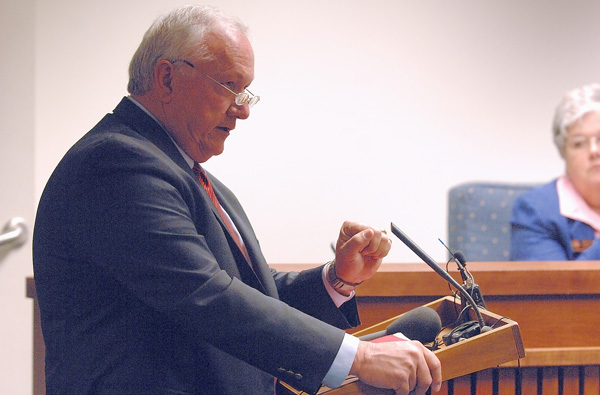PHOENIX, AZ—2011 will be recorded as a turning point in the battle between conservative politicians in Arizona who supported laws like SB 1070 – a law that made it a state crime for a person to be an undocumented immigrant in Arizona – and the pro-immigrant rights groups that stood in opposition.
For close to a decade, Arizona has been the nation’s primary battleground over immigration. The state has passed some of the nation’s most stringent anti-immigrant laws, including SB 1070. That law faced numerous court challenges, and its fate will be decided by the U.S. Supreme Court, probably in June.
While states including Alabama set into motion even harsher laws targeting the undocumented, creating a climate of fear and panic in immigrant communities, in Arizona, politicians who pushed those policies suffered a brutal backlash.
The Campaign Against State Senator Russell Pearce
The year began with a grassroots, bi-partisan group of citizens and business leaders developing a plan to recall SB 1070’s architect, State Senator Russell Pearce. The movement grew without much media attention initially, but steadily gained momentum.
Buoyed by his success with SB 1070, Pearce decided in 2011 to spearhead an effort to deny birthright citizenship to the children of undocumented immigrants born in the U.S. by passing a state law that would force a legal challenge to the 14th amendment of the U.S. Constitution.
Pearce also wanted to pass four other anti-immigrant bills. The legislation would have required schools to check on the immigration status of students, and hospitals to ask about the immigration status of people they provide services to.
But Pearce’s tough immigration bills failed to pass, even though his hardline immigration reputation led to his election as president of the Arizona Senate. Opposition from business leaders and immigrant advocates, and the votes of 12 Republican senators meant Pearce didn’t have enough support to pass his bills.
Many of Republican senators who had voted for SB 1070 said “enough is enough” when it came to immigration after receiving a letter from 60 CEOs that urged Pearce to stop the bills.
“Arizona’s lawmakers and citizens are right to be concerned about illegal immigration. But we must acknowledge that when Arizona goes it alone on this issue, unintended consequences inevitably occur,” the letter read. “Last year, boycotts were called against our state’s business community, adversely impacting our already-struggling economy and costing us jobs. Arizona-based businesses saw contracts canceled or were turned away from bidding. Sales outside of the state declined.”
Pearce’s Collapse
In a clever campaign that appealed to a broad swath of voters, the anti-Pearce forces, calling themselves Citizens for a Better Arizona (CBA), focused not on Senator Pearce’s role on immigration issues but rather his style of leadership, which they defined as “extreme.” They underscored his involvement in cutting state funding of education and health.
At first, Pearce didn’t seem to take the threat of a recall seriously. But as the months went by and CBA filed over 10,000 valid signatures needed to force a special recall election, he started to get nervous.
In a desperate attempt to divide the Latino vote against Pearce, members of the Tea Party supported a Latina Republican candidate in the Senate election, Olivia Cortes, but she was ultimately forced out of the race by the threat of lawsuits alleging she was a sham candidate.
In the end, Pearce lost to political newcomer Jerry Lewis, who got 53 percent of the vote in one of the most conservative districts in the state. Like Pearce Lewis is a Republican and a Mormon. It was a stunning reversal, considering that Pearce had represented his district for over a decade.
CBA’s victory represented the birth of a new form of organizing in Arizona that is bi-partisan and includes a broad group of people at the grassroots level.
The Attack on “America’s Toughest Sherrif”
The pro-immigrant allies were invigorated. Before the applause subsided over Pearce’s defeat, there were renewed calls for Maricopa County Sheriff’s Joe Arpaio’s resignation, and CBA announced a campaign to remove him from office.
With a federal Department of Justice lawsuit looming over Arpaio’s agency (MCSO) for racial profiling against Latinos, one of the most influential proponents of SB 1070 was under attack. On the heels of criticism from the DOJ, Arpaio’s jailers lost some of their immigration law enforcement powers this fall, which had allowed them to inquire about the immigration status of people entering county jails and match their fingerprints to those in a federal database.
The revocation of MCSO’s powers to enforce the federal 287g and Secure Communities programs was frosting on the cake for many opponents of the sheriff and the state’s anti-immigrant policies.
Their cries for his removal grew louder just a few weeks ago when the AP reported that Arpaio’s agency failed to properly investigate hundreds of sex crimes. Many of the victims had Latino surnames.
The final blow for Arpaio this year was the report from a three-year DOJ probe which described his agency’s abuses towards Latinos as the most “egregious” in the nation.
Former County Attorney General, Andrew Thomas Also on Shaky Ground
Arpaio and Pearce are not the only politicians who felt the heat this year. Former County Attorney General, Andrew Thomas, known for his unique interpretation of state immigration laws, faces the possibility of loosing his attorney’s license due to an investigation by the Arizona State Bar.
Thomas assumed office after a campaign in which he promised to end illegal immigration. He immediately teamed up with Sheriff Arpaio to use a set of state laws against undocumented immigrants that would result in prosecutions and felonies to keep people from migrating legally to the U.S. in the future. He also used a state law created to fight human smuggling to prosecute immigrants who pay for the services of border-crossing coyotes. A state civil-employer sanctions law was used by Thomas to bring charges of ID theft against undocumented workers who use false papers to obtain employment.
Now, Thomas, who is one of Arpaio’s strongest allies, is under scrutiny for possible ethics violations that involve using his powers to retaliate against political enemies by initiating investigations without probable cause. The sheriff is also implicated in this issue and is under investigation by a federal grand jury.
Looking forward to 2012
With the architect of SB 1070 out of office and two major anti-immigration crusaders on shaky ground, the politics of immigrations appear to be shifting in Arizona.
CBA now has Arpaio in its crosshairs. Members of the PUENTE movement, a human rights group, are planning to keep protesting against Sheriff Arpaio and raise the bar by turning the heat on those who support him. Others are planning to focus on Latino voter registration to keep up the momentum after Pearce’s recall.
Yet it’s unclear how much traction pro-immigrant forces will have in 2012, a presidential election year. Some observers say it’s unlikely that the Obama administration will take action on the criminal investigation of Arpaio.
GOP presidential candidate Rick Perry has dismissed the DOJ’s investigation into Arpaio’s office as politically motivated. And Republican candidates continue to chastise the Obama administration for being weak on illegal immigration.
Probably the most important variable in the immigration debate next year will be the U.S. Supreme Court decision on the legality of SB 1070. Arizonans on all sides are anxiously awaiting the court’s ruling. They want an authoritative answer to the question of how individual states and the nation at large should handle the presence of millions of undocumented immigrants.
Feet in Two Worlds is supported by the New York Community Trust and the John S. and James L. Knight Foundation with additional support from the Mertz Gilmore Foundation and the Sirus Fund.




